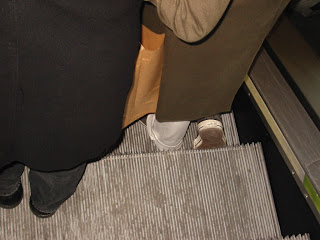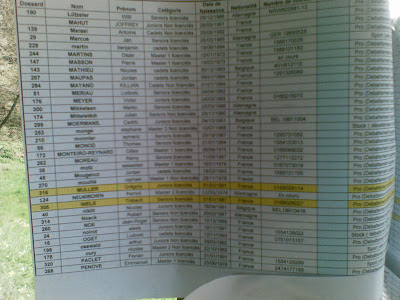Duck is good bargain food. For ~$20, I get 2 nights of meals for 2 out of the breasts, another generous dinner for 2 out of the confit'd thighs and legs, the skin not on those parts gets rendered (for later confits, sauteing potatoes, etc), and the bones and scraps go into stock, which gets used for soup, sauces, and risotto. Besides being good value, it's also great taste. Meaty without being heavy, a little sweet, and very versatile-- friend to fruit and spice.
And, as relevant as good value to my cooking and eating right now, duck is not squid. Turns out 2 lbs of squid is more than (this) 1 person needs at one time.
 Squid
Squid Not squid
Not squidIn Philly, I always buy whole duck from one of my vendors I know has it fresh. Ducks seem more expensive here, making confit is a long slow oven roast I like better in winter, and our tiny freezer with huge temperature swings isn't ideal for storing multiple stocks, so I'll hold off on the whole duck until I want to make ragu from the legs and thighs. But fresh duck breast, or magrets, can be found at most poultry purveyors, curiously always in vacuum-pacs. I got my first one today at the Prez Wilson market.
I did my vegetable shopping there too, at Joël Thiébaut's stand. Aside from having a name I have no idea how to pronounce, Mr Thiébaut is different from my produce vendors at home in that he sells only vegetables, no fruits, and he's vegetable provider to the restaurant stars. As such, the stand is always very busy, and so you might expect a bit uppity. But not so—they know their vegetables, love their vegetables, and share that knowledge and enthusiasm with their customers, many of whom are little old ladies who leave the stand carrying pallets of spinach or pulling huge carts groaning with vegetables. Today they had an assortment of asian greens I'd never seen before, including mibuna, which looks like a long, skinny spinach, and which they said was both sweet and peppery at the same time. Sounded interesting.
 Mibuna, also not squid
Mibuna, also not squid
I did my vegetable shopping there too, at Joël Thiébaut's stand. Aside from having a name I have no idea how to pronounce, Mr Thiébaut is different from my produce vendors at home in that he sells only vegetables, no fruits, and he's vegetable provider to the restaurant stars. As such, the stand is always very busy, and so you might expect a bit uppity. But not so—they know their vegetables, love their vegetables, and share that knowledge and enthusiasm with their customers, many of whom are little old ladies who leave the stand carrying pallets of spinach or pulling huge carts groaning with vegetables. Today they had an assortment of asian greens I'd never seen before, including mibuna, which looks like a long, skinny spinach, and which they said was both sweet and peppery at the same time. Sounded interesting.
 Mibuna, also not squid
Mibuna, also not squidFor my dinner-out in, I made a spice mix to rub into the slits I cut in the duck skin to give the fat someplace to go so the skin would crisp-- coriander, cumin, and a little allspice. Pan seared, finished to medium rare in the oven, let rest, and sliced and served sprinkled with a few grains of gray sea salt. Simple and traditional. The duck was simply outstanding. While searing, it smelled pretty aggressively livery (US duck can taste livery if cooked much past med-rare), but when finished the flavor was rich, full, and mellow and the mahogany skin was cracklingly crisp with just a hint of spice. The mibuna was the perfect accompaniment-- sauteed with some garlic and just a little salt and pepper, it was indeed a little sweet and finished with a peppery, almost minty, bite. With some simple mashed potatoes and a rhubarb-ginger compote, I think this may have been the best meal I've eaten so far in Paris. I'll have to eat here again.
It's a shame I didn't anticipate this success and seek out a more deserving wine than our 5-euro house Cahors-- a more sophisticated Cahors, or a St Joseph, would have been ideal. It's also a shame Karen wasn't here to share in the eating, and she might be mad if she finds out what she missed. She hates beets, so I'm hoping she'll skip this post.
 Nothing but beets
Nothing but beets















































